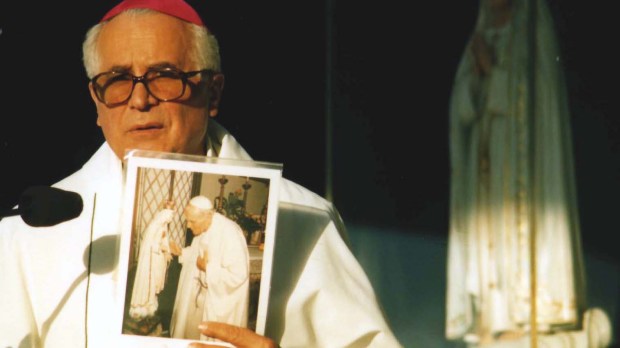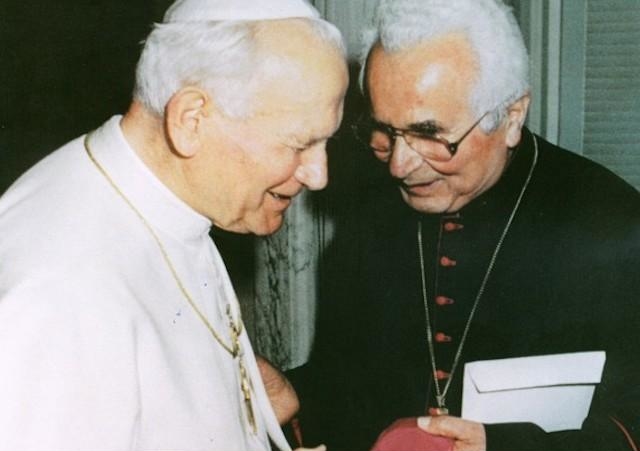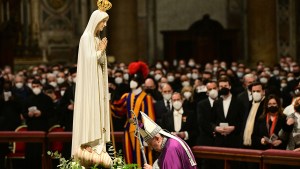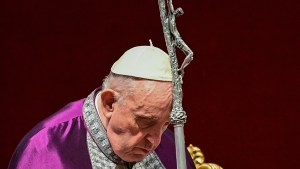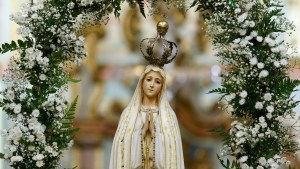Within the walls of the Vatican, some people used to call him the James Bond of John Paul II’s pontificate. Indeed, the Polish pope regularly charged him with special missions that were as secret as they were dangerous. For example, going to Moscow to secretly celebrate Mass and consecrate Russia and the world to the Immaculate Heart of Mary … the day before the same act of consecration pronounced by John Paul II in St. Peter’s Square on March 25, 1984.
At a time when the Soviet Union was crushed by a totalitarian and officially atheistic regime, this task had all the makings of an impossible mission. But not for Pavel Hnilica (1921-2006), a Slovakian Jesuit who was clandestinely ordained a priest in 1950, in the midst of the religious persecution that communist Czechoslovakia was undergoing at the time. He was finally exiled to Rome and appointed bishop in the greatest secrecy in 1951 by Pius XII. In 1976, he met Bishop Karol Wojtyla, the future Pope John Paul II.
As Tomasz Terlecki, author of the biographical work Biskup do zadan specjalnych (The Bishop of the Special Missions), relates, as soon as the Polish pope was elected, the Slovak bishop openly told John Paul II, “Holy Father, the consecration and conversion of Russia must take place during your pontificate.”
John Paul II, who knew of Bishop Hnilica’s great devotion to Mary, replied: “If you convince the bishops, I will consecrate her to Mary immediately.” However, nothing happened for several years.
That all changed on the day of the assassination attempt on John Paul II, on May 13, 1981, the feast of Our Lady of Fatima. The Polish Pope was rushed to the Gemelli Clinic and was in critical condition. The whole world united in prayer.
Miraculously saved, John Paul II immediately became aware of the link between his attack and the message of Fatima. This prompted him to ask for the contents of the third secret of Fatima to be revealed to him, which he had not previously been interested in.
After reading it, he was sure not only that it was Mary who had saved his life, but also what he should do in the near future. He confided to Bishop Hnilica during his convalescence in August 1981:”I understood that the only way to save the world from war, to save it from atheism, was to convert Russia according to the message of Fatima.” A year later, on the anniversary of the assassination attempt, the Pope was already in Fatima to thank the Virgin for having survived Mehmet Ali Agca’s bullets. And he entrusts the world to her.
Mother Teresa and the Russian visa
In his book, Tomasz Terlecki recalls the words of Sister Lucia about this act of consecration. The visionary of Fatima, who remained alive for a long time after the death of the other two visionaries shortly after the apparitions, emphasized that this consecration “did not fulfill everything that Our Lady asked for, because it did not include a special consecration of Russia to Our Lady.” Moreover, it was not made in unity with the bishops of the whole world. John Paul II decided to repeat the gesture two years later. March 25, 1984, marked the definitive consecration of the world and of Russia to the Immaculate Heart of Mary. The consecration took place in St. Peter’s Square and in dioceses throughout the world.
When Pavel Hnilica learned of the Pope’s decision, he wanted to go to Moscow to be there on the day of the consecration. But how could he do this? The answer came during his stay in Calcutta. Hosted by his friend Mother Teresa, the Jesuit bishop studied with her the possibility of sending sisters from his congregation to the Soviet Union. And it was there that he had an incredible idea: to request a transit visa for a few days from the Soviet embassy in Calcutta. He thought that, if he was lucky, officials would not have the instinct to link his status as a bishop of the Roman Curia with his identity as a Czechoslovak opponent. He asked for the most banal tourist visa possible, for the period from March 22 to 25. At the same time, Mother Teresa asked all the sisters to pray. As he would later recount, a miracle took place: the bishop persecuted by the communists obtained a Russian transit visa that allowed him to cross the Soviet Union.
On March 24, the day before the solemnity of the Annunciation, the day John Paul II planned to consecrate the world and Russia to the Immaculate Heart of Mary, Bishop Hnilica managed to get to the Kremlin with a group of diplomats. The official purpose? A tourist visit to the Orthodox churches. Before entering the Church of St. Michael the Archangel, a security officer tried to retrieve the priest’s small bag, the one containing the host and wine needed for the celebration of Mass. “I held the medal of the Virgin Mary in my hand, well hidden. I’m sure it helped me at that moment,” he said later. Finally, the Jesuit entered the church accompanied by another Catholic priest, and the two men were not searched.
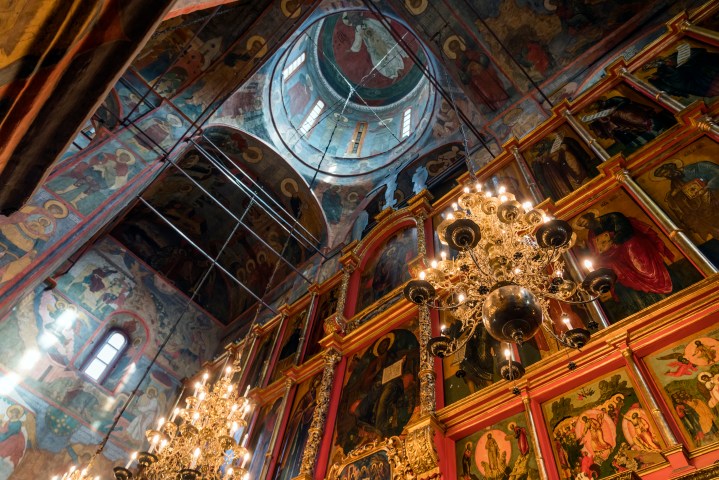
The act of consecration hidden in the Pravda
“I entered the interior of the church, approaching the altar. Then I took Pravda (the official newspaper of the Communist Party) from my bag and unfolded it near me. Between its pages was L’Osservatore Romano (the official newspaper of the Vatican) with the publication of the text of the Act of Consecration of the World written by John Paul II,” Bishop Hnilica would later confide, quoted by Tomasz Terlikowski. And he continues: I began to pray:
“O Mother of men and peoples, you who know all their sufferings and hopes, you who feel in a maternal way all the struggles between good and evil, between light and darkness that shake the contemporary world, receive the call that, with your love as mother and servant of the Lord, embrace our human world, which we offer and consecrate to you, full of concern for the earthly and eternal fate of men and peoples. We offer and consecrate to you in a special way those men and nations who are in particular need of this offering and consecration …”
The priest-spy remembers
“There, in this church in the heart of the Kremlin, I united myself spiritually with the Holy Father and all the bishops of the world, and in union with them I made the act of consecration of Russia to the Immaculate Heart of Mary. Then I went to the Church of the Assumption of Our Lady. In front of the altar dedicated to Mary, I repeated it. Once again, I took out my Pravda with L’Osservatore Romano inside, and once again I joined the Holy Father and all the bishops. I even celebrated Mass in that church! How was this possible? I pretended to take pictures. An empty aspirin bottle served as a chalice. There was wine and a few drops of water in it. The hosts were in a small nylon bag. The liturgical text of the Feast of the Annunciation was hidden in the pages of Pravda. Perhaps for the first time, this newspaper contained the whole truth — the text about the Annunciation. It was the most moving Mass of my life,” he would later confide.
I understood that from that day on Russia belonged to the Virgin Mary and that the Lord would one day free her from the power of Satan.
Although the Mass lasted only three quarters of an hour, for Bishop Hnilica it was one of the most important liturgies of his life: “When I left the Kremlin, I felt transformed, I felt God’s hand accompanying me and protecting me. So I did not worry about the consequences because I knew the power of God. I understood that from now on, Russia belonged to the Virgin Mary and that the Lord would one day liberate it from the power of Satan,” he said on his return.
Back in Rome, during a private audience, Bishop Hnilica told the Pope what he had done in Moscow. John Paul II told him: “That day, dear Pavel, the Virgin took you by the hand. “No, Holy Father,” the Jesuit replied. “She carried me in her arms.”
